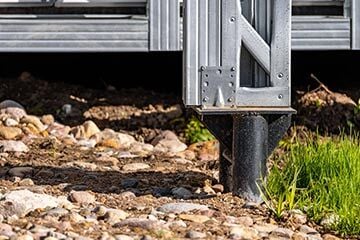"When comparing home insurance policies, remember your cover needs can change over time. Add any home improvements or lifestyle changes before comparing quotes to get the most accurate price."
How to compare prices
Just tell us a bit about you and your home. We'll do the rest. To find you the right cover, at the right price, here's what we'll ask:
Your property
Security
The type of cover
A bit about you
We'll use this to show you tailored quotes.
 How to choose the right level of cover
How to choose the right level of cover
Getting the right cover means making sure it suits your home and how you live. Too much cover and you’ll end up overpaying; too little and you might not be properly protected. We’ll help you strike the right balance.
Choose the right home insurance for you
Whether you own your place or rent it, we’ve got options to suit you:
Insurance for homeowners
Think of home insurance as a safety net. If a pipe bursts, or there’s a break-in, it can help pay for repairs or replacements. It can include cover for:
-
Rebuild costs if your home is damaged - not just your home’s value
-
Stolen or damaged contents like furniture, tech, and other valuables
-
Cover for outbuildings, sheds and garages
-
Fire, flood or storm damage
Here's some add-ons you may want to consider:
-
Accidental damage – for smashed screens and DIY fails
-
Personal possessions cover – phones, laptops, jewellery
-
Home emergency cover – for boiler breakdowns, burst pipes and more
Insurance for renters
Your landlord sorts the building, but you’ll want to protect what’s yours. Here’s what to keep in mind:
- No need for buildings cover
- To protect your stuff you can buy contents cover
- Check for shared home cover if you live with housemates
If you want more than just the basics, it may be worth getting these add-ons:
-
Tenants' liability – some landlords might ask for it
-
Accidental damage – handy for spills, knocks or dropped TVs
-
Personal possessions – cover for valuables you take out of the house such as bikes and laptops
Insurance for landlords
Do you rent out a property? You can buy specialist landlord insurance. Here’s what to look out for:
- Buildings cover, fixtures and fittings protection
- Liability cover – in case tenants get injured on your property
- Loss of rent – if your property becomes unlivable and tenants can’t stay there
You may want to consider buying these optional extras:
-
Alternative accommodation for tenants
-
Cover for malicious damage
-
Home emergency cover
Insurance for students
Living away from home? Think about:
- Contents insurance - to cover your belongings in uni halls or shared housing
- Protection for essentials like laptops, consoles, and phones
- Check if you’re already covered by a parent’s policy
Handy add-ons for student life.
-
Personal possessions cover –to protect things you take out and about
-
Accidental damage – for spills and drops
-
Bike cover – ideal if you’ve left your car at home
Insurance for holiday homes
If you have a holiday home, here’s what to consider:
- Is it just for you, or do you let it out?
- Do you need seasonal or year-round cover?
- Will it be empty for long periods?
Handy extras for when you're not there in person.
-
Cover for guests or short-lets
-
Emergency repairs when you’re not there
-
Public liability – in case guests are hurt while staying at your property
Upgrade your cover with our home insurance add-ons
Want more cover? These optional extras can help:
Personal possessions cover
Accidental damage cover
 How to get our best prices
How to get our best prices
Prices depend on your home, location and cover. Here’s what Confused.com customers paid on average for their home insurance:
How to save money on your home insurance
-
Pay annually - monthly payments often come with added interest
-
Increase your voluntary excess - but only if you can afford it
-
No-claims bonus - save more each year you don’t claim
-
Accurately estimate your contents - too high and you might overpay
-
Shop around, compare quotes, and don’t auto renew! - Switching is often much cheaper than renewing
For more ways to save, see our guide on tips to reduce your home insurance.
Our expert says:
Join thousands of happy customers who’ve already made the switch





















